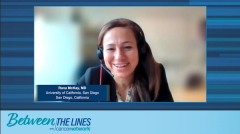
Choosing a First-Line Combination Treatment Regimen for Renal Cell Carcinoma
Drs Rana McKay and Tom Powles debate the merits of different first-line combination treatment regimens for renal cell carcinoma.
Episodes in this series

Thomas Powles, MBBS, MRCP, MD: The question I’m always asked on these podcasts or videos is which treatment do you use? Which do you select? Why?
Rana McKay, MD: Good question. It varies. We chatted a lot about I/O [immuno-oncology]–TKI [tyrosine kinase inhibitor] combinations. There are also I/O–I/O combos. We have over 5 years of follow-up data from the nivolumab-ipilimumab data, which show durability of response. The tail on the curve is hanging around 30% and continues to be consistent. There are 2 strategies. Do you need to play the short game, or do you need to play the long game? As I’m counseling patients about that, and as we think about choices in the clinic with nivolumab-ipilimumab, we’re largely playing the long game. Not that I want to compare, but the durability of that regimen is incredibly attractive.
But some individuals need to play the short game because they won’t have a long game. Patients who have an almost visceral crisis need to have a response. That’s where an I/O–VEGF comes in nicely. As we think about the nivolumab-ipilimumab data, while you have that 30% tail, about 1 of 5, 18%, are going to have primary PD. We don’t know who they are. We don’t know how to identify who those individuals are to not give them nivolumab-ipilimumab. These are questions that are in the field, but that’s how I try to strategize around it.
Lenvatinib-pembrolizumab is highly effective. I like to use that regimen in patients who have potentially locally advanced unresectable disease. I want an immediate short-term response to get them resected. That’s the perfect population because the response rate is so high and the primary PD rate is so low. That’s where I like to use this regimen.
Thomas Powles, MBBS, MRCP, MD: My thoughts are similar. For centers that are treating a handful of patients each year, rather than dozens of patients, it’s probably easier to pick 1 regimen and stick with it. I agree that nivolumab-ipilimumab is not for all patients. If you’re going to pick 1 regimen, it’s probably easier to use a VEGF TKI–I/O. There are some patients I’d give nivolumab-ipilimumab to. For example, patients with intermediate-risk disease and perhaps low-volume metastases, where I wouldn’t be worried if they got primary progression of disease. Those patients would be good candidates for nivolumab-ipilimumab.
We’ve talked about the good-risk patient. We know they can’t have nivolumab-ipilimumab; it’s not licensed. It’s a bit nuanced. But there’s nothing wrong with using VEGF TKI–I/O in unselected patients. All 3 regimens have attractive features. Pembrolizumab has a 0.53 hazard ratio, which came out first. People like axitinib; it has a short half-life. The lenvatinib-pembrolizumab data efficacy data look unbeatable from a PFS [progression-free survival] and response perspective. Everyone likes cabozantinib. Everyone likes nivolumab. Of course, the cabozantinib dose at 40 mg is attractive, and there are some good quality-of-life data as well. So you could make an argument for any of the 3 regimens. Picking 1 and using it well makes sense to me.
Rana McKay, MD: I completely agree with you. The dose modifications around the TKIs can get challenging. Having a strategy and a game plan is key to optimizing use for a clinician.
Transcript edited for clarity.
Newsletter
Stay up to date on recent advances in the multidisciplinary approach to cancer.






























































